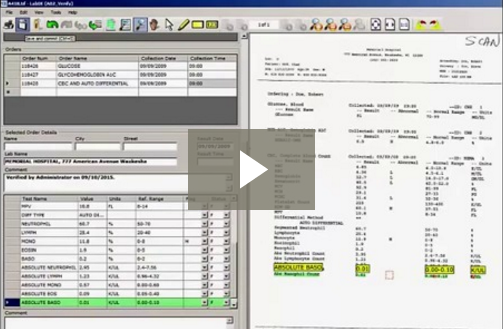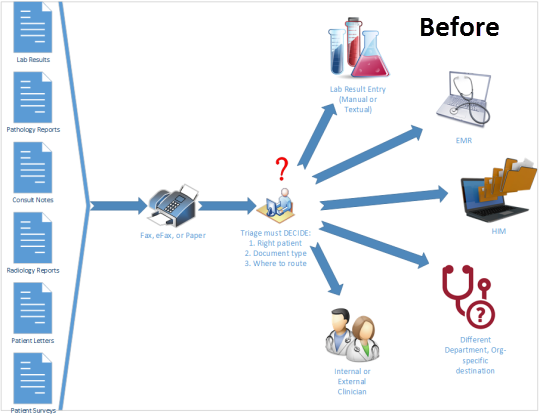Wait, is my title an oxymoron? If data is “non-interfaced”, how can there be an interface for it? Well, if data is not interfaced, it’s usually because of one of these two things:
Read MoreEllen Bzomowski
Recent Posts
Posted by Ellen Bzomowski on Oct 6, 2016 8:10:00 AM
It’s a frequent topic of conversation between us and our prospective customers. They come to us because their quality reports are not complete… and it’s frustrating. They are struggling to get the data they need. Here are some examples that we often hear about:
Read MorePosted by Ellen Bzomowski on Sep 13, 2016 8:00:00 AM
A few things to ponder when assessing whether not your non-interfaced data is HIPAA compliant:
Is a fax of a patient’s lab results
sitting at a nurse’s station safe?
Hopefully, yes, but in reality, no...
Any “paper” lying around in a healthcare organization poses the risk of being misplaced or inadvertently made accessible to someone who should not see it. Why is it likely there then? Your staff wants the information that’s on it.
Read MorePosted by Ellen Bzomowski on Aug 18, 2016 8:30:00 AM
I was just listening to a webinar by a reputable Health IT vendor the other day on visual security and privacy risks in healthcare. As my company offers many ways to help with the challenges that healthcare organizations face with keeping PHI protected, I was interested in hearing what another solutions provider had to say.
Read MorePosted by Ellen Bzomowski on Aug 2, 2016 8:00:00 AM
Have you been involved with clinical data management (CDM)?
If so, you know that following a defined and consistent process will lead to statistically sound data from clinical trials—every hospital’s dream. Part of that process may involve converting unstructured data into structured data which generally includes:
Read MorePosted by Ellen Bzomowski on Apr 19, 2016 1:28:51 PM
I chose the title for this blog a bit tongue in cheek. You see, there are numerous blog posts about how to “properly” redact PDF files. While all of those other blog posts correctly explain the challenges that makes redacting PDF files difficult and outline all of the steps that one must take to ensure private information is completely and irreversibly redacted, all of those blog posts fail to mention one critical idea that anyone tasked with the important job of redacting electronic documents should be aware of -- automation.
Read MorePosted by Ellen Bzomowski on Apr 14, 2016 6:00:00 AM
Last week at a healthcare trade event, a director of a top program (I’ll call her Sandy – not her real name.) witnessed something so shocking that it nearly brought her to tears...of joy.
Read MorePosted by Ellen Bzomowski on Jan 27, 2016 8:03:29 AM
Do you frequently find yourself searching for and routing documents, whether paper or electronic, to colleagues, care team members or departments that need them? Or, worse do you find yourself waiting for documents to be routed to you? In our work, helping hospitals to automate clinical data abstraction, we're struck by the hours of time lost each day to inefficient workflows involving "loose" records that we often find ourselves helping our customers extract data from.
These are routine tasks that you may not even be aware of because they are taken for granted as "the way we've always done it."
Read MorePosted by Ellen Bzomowski on Dec 21, 2015 3:02:55 PM
A consultant who supports analytics for population health and quality of care recently told me that frequently, they can only access 80% or less of the total data needed for these initiatives.
Posted by Ellen Bzomowski on Oct 16, 2015 11:55:45 AM
Earlier this year, the CDC, as a part of their Morbidity and Mortality Weekly Report, published an article entitled: Using Electronic Clinical Quality Measure Reporting for Public Health Surveillance. The article begins by giving us some positive statistics on the increasing use of EHRs and the data from those EHRs being helpful to population health initiatives. It specifically focuses on “clinical performance goals of Million Hearts, a U.S. Department of Health and Human Services initiative that was launched in 2012 to prevent 1 million heart attacks and strokes by 2017.” The power of focusing on just a few Clinical Quality Measures (Blood pressure, aspirin, and Cholesterol measures) associated with such a clear goal showed positive trends in a steadily increasing number of providers providing these CQMs based on this incentive.
Read More








